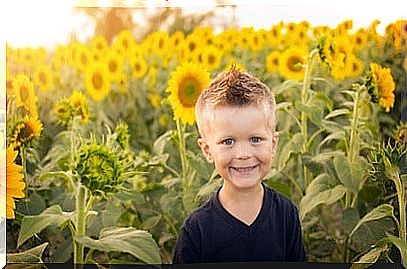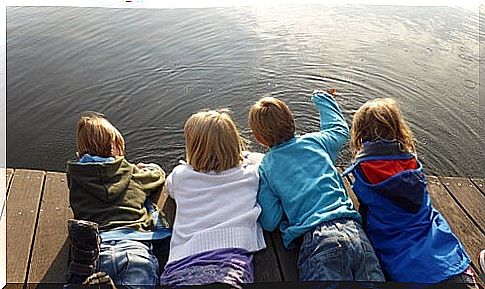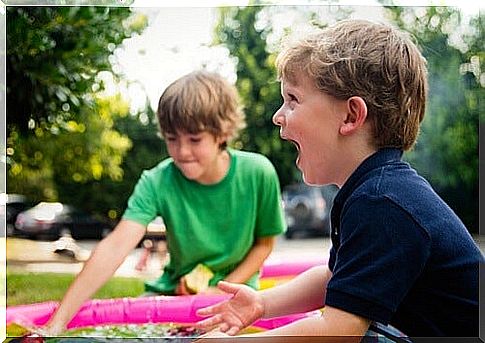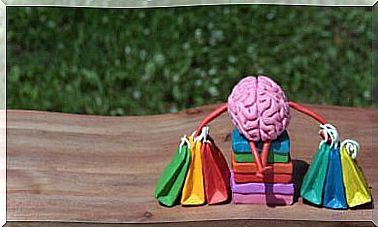Assertive Children, Happy Children

Assertive children are happier children. They are so because they learn to communicate their desires, because they stand up as people capable of setting limits, thus improving their social performance. Now, whether we have a greater or lesser facility, this competition does not come from the “factory”, we are the ones who can / must help the little ones to develop this skill.
We could say, almost without mistake, that, sometimes, we neglect what children really need. We choose goals such as finding the best school for them, facilitating English classes, support teachers in those areas where they are not doing well, we worry about the type of friendships they have and aspects such as regulating the use they make of electronic devices.
This is all very good. However, what about your emotional competencies? What about your social skills? Sometimes, we take for granted that dimensions, such as self-esteem, assertiveness and even self-concept, already come in their genetic code and are gradually shaped in the same way that children grow.
Now, we must not be wrong. These dimensions must be nurtured on a daily basis, addressed and applied with a delicate, intuitive and firm guide so that children acquire skills in these basic areas for life, happiness and psychological well-being. Let’s delve into that essential value this time: assertiveness.

Assertive children, how to educate them?
To give assertive children to the world you need patience and wisdom. Often many parents and educators also complain of having two types of boys or girls. There are those who argue as much as they breathe. They are the ones who are always frustrated and sulking because they assume that almost everyone is against them; because they cannot do or have what they want at any given time.
Thus, and on the other side, there are those who are characterized by that hermetic passivity where they never say what they feel, those who do not claim. They are those little ones who are often the easy target in the dynamics of school bullying. Lack of assertiveness often leads to two very extreme poles: passivity or aggressiveness. Neither of these dimensions undoubtedly brings good consequences.
Being able to give assertive children to the world is one way to invest in their happiness. Even more, as they explain to us from studies such as the one published by Gertrude E. Chitten in the journal Society for Research in Child Development , we will be investing in creating a more respectful society. Let’s see how to do it.
We will teach them that the world is based on limits
To educate assertive children, we must initiate them early on a very clear idea: the world is full of limits that we must respect. Educating is not just telling them what is right and what is wrong. There is something more than morality: there is civility, human respect, adapting to social codes to coexist.
- The world is full of limits, such as physical, emotional and even economic (we cannot, for example, spend money on things that are not necessary).
What is assertiveness, what is it for and how is it used?
Children understand much more than we think. Moreover, before speaking fluently, the little ones understand many more concepts than they can express. Therefore, we must bear in mind the need to instill in them these principles:
- I must be able to express what I feel without fear, but with respect.
- Mom and Dad are not going to punish me for what I say. They are my safe space to also express my negative emotions, such as what scares me, makes me angry and worries me.
- I have to be able to listen respectfully to what others are saying to me.
- I must understand that I am not always going to have what I ask for or desire. I will learn little by little to be patient, to tolerate my frustration.

Assertive kids need role models to build on
Another essential aspect is that we cannot ask children to comply with rules that we ourselves do not respect. Thus, if we speak with our partner with a certain aggressiveness and lack of respect, our children will imitate that communicative model.
If we want to give the world assertive and happy children, let us be not only their best role model and guide, but also their daily inspiration.
Give them responsibilities, respect their choices and privacy
Children, especially from the age of 8, will claim their privacy space. This is something that as parents we must respect, but also favoring that trust so that at any time, they feel free and safe to share their concerns with us.
On the other hand, one way to increase their assertiveness is by giving them age-appropriate responsibilities. Something like this favors their sense of competence, self-efficacy and adequate self-confidence.

Emotional intelligence and assertiveness
Last but not least, it is necessary that as parents or educators, we are able to instill in them adequate skills in Emotional Intelligence. Something like this will help them to manage their emotional world much better, control impulses, improve their social skills and that emotional communication so basic in their day to day life.
As we can see, there are many details, aspects and values that we must instill or awaken in our little ones so that little by little they open up to their immediate present with greater assertiveness and solvency. This is an adventure that will last for years, where there will be critical moments and moments of great achievement. Let’s be patient, let’s be first of all that always attentive and close look that knows how to be at every moment.









